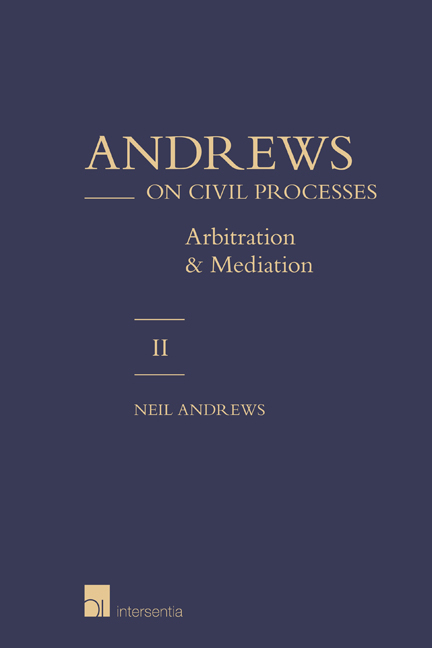Book contents
- Frontmatter
- Dedication
- CONTENTS VOLUME I
- Contents
- Table of Cases
- Table of Statutes
- Table of Statutory Instruments
- PART I MEDIATION
- PART II ARBITRATION
- Chapter 3 Commercial Arbitration: What Is It and Why Choose It?
- Chapter 4 The Major Principles of Arbitration and Litigation: A Comparison
- Chapter 5 Fundamental Features of English Arbitration
- Chapter 6 ‘The Seat’ and the Range of Relevant Laws
- Chapter 7 ‘Arbitrability’: Public Policy Limitations upon the Scope of Arbitration
- Chapter 8 A Confidential Process
- Chapter 9 Arbitration Agreements
- Chapter 10 Courts Giving Effect to Arbitration Agreements
- Chapter 11 Commencement of the Submission and Time Issues
- Chapter 12 The Tribunal's Appointment, Tenure and Immunity
- Chapter 13 Pre-Hearing Proceedings
- Chapter 14 The Hearing
- Chapter 15 Final Remedies, the Award, and Correction of the Award by the Tribunal
- Chapter 16 Fees, Expenses and Recoverable Costs
- Chapter 17 Arbitration Awards: Issues of Finality and Res Judicata
- Chapter 18 Challenges to English Arbitral Awards under English Law
- Chapter 19 English Enforcement of English Awards
- Chapter 20 Enforcement under the New York Convention (1958)
- PART III CONSUMER ADR
- Select Bibliography
- Index to Volumes I and II
Chapter 14 - The Hearing
from PART II - ARBITRATION
Published online by Cambridge University Press: 13 December 2017
- Frontmatter
- Dedication
- CONTENTS VOLUME I
- Contents
- Table of Cases
- Table of Statutes
- Table of Statutory Instruments
- PART I MEDIATION
- PART II ARBITRATION
- Chapter 3 Commercial Arbitration: What Is It and Why Choose It?
- Chapter 4 The Major Principles of Arbitration and Litigation: A Comparison
- Chapter 5 Fundamental Features of English Arbitration
- Chapter 6 ‘The Seat’ and the Range of Relevant Laws
- Chapter 7 ‘Arbitrability’: Public Policy Limitations upon the Scope of Arbitration
- Chapter 8 A Confidential Process
- Chapter 9 Arbitration Agreements
- Chapter 10 Courts Giving Effect to Arbitration Agreements
- Chapter 11 Commencement of the Submission and Time Issues
- Chapter 12 The Tribunal's Appointment, Tenure and Immunity
- Chapter 13 Pre-Hearing Proceedings
- Chapter 14 The Hearing
- Chapter 15 Final Remedies, the Award, and Correction of the Award by the Tribunal
- Chapter 16 Fees, Expenses and Recoverable Costs
- Chapter 17 Arbitration Awards: Issues of Finality and Res Judicata
- Chapter 18 Challenges to English Arbitral Awards under English Law
- Chapter 19 English Enforcement of English Awards
- Chapter 20 Enforcement under the New York Convention (1958)
- PART III CONSUMER ADR
- Select Bibliography
- Index to Volumes I and II
Summary
ARBITRAL TRIBUNAL's POWER TO DISPENSE WITH AN ORAL HEARING
The English legislation provides that, unless the parties otherwise agree, the tribunal's power to dispense with an oral hearing is an aspect of its procedural discretion (before the Arbitration Act 1996 (England and Wales) the position was otherwise).
However, the LCIA Rules states that a party can insist on an oral hearing.
PIVOTAL ROLE OF THE CHAIRMAN
Where the tribunal consists of more than one arbitrator (on the question of appointment of the tribunal, 12.01 ff), problems of joint conduct, administrative convenience, and disagreement, might arise. The chairman's role can be fundamental in smoothing over these problems and ensuring that the hearing remains orderly.
Although mentioned now in the context of the hearing, these issues arise as soon as the reference is begun. The provisions now cited govern throughout the life of the reference. The Arbitration Act 1996 (England and Wales) provides:
(1) Where the parties have agreed that there is to be a chairman, they are free to agree what the functions of the chairman are to be in relation to the making of decisions, orders and awards.
(2) If or to the extent that there is no such agreement, the following provisions apply.
(3) Decisions, orders and awards shall be made by all or a majority of the arbitrators (including the chairman).
(4) The view of the chairman shall prevail in relation to a decision, order or award in respect of which there is neither unanimity nor a majority under sub-section (3).
If the parties have not provided for a chairman or umpire, and if there is no last-ditch agreed criterion for resolving an impasse, so that a majority does not exist, it is suggested that the court might assume control.
ARBITRATOR CEASING TO HOLD OFFICE
Section 27 of the Arbitration Act 1996 (England and Wales) governs the situation ‘where an arbitrator ceases to hold offi ce’. An arbitrator (that word presumptively including an umpire) might cease to hold offi ce in various situations: (i) by revocation of his authority; (ii) because he is removed by court order; or (iii) because he resigns, or dies.
Information
- Type
- Chapter
- Information
- Andrews on Civil ProcessesArbitration and Mediation, pp. 285 - 300Publisher: IntersentiaPrint publication year: 2013
